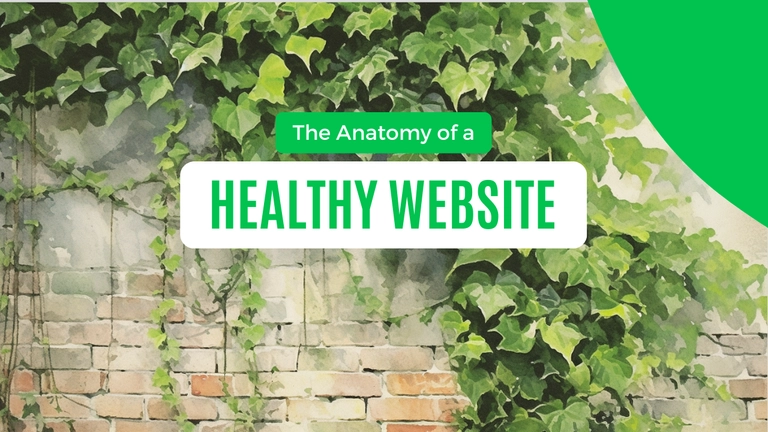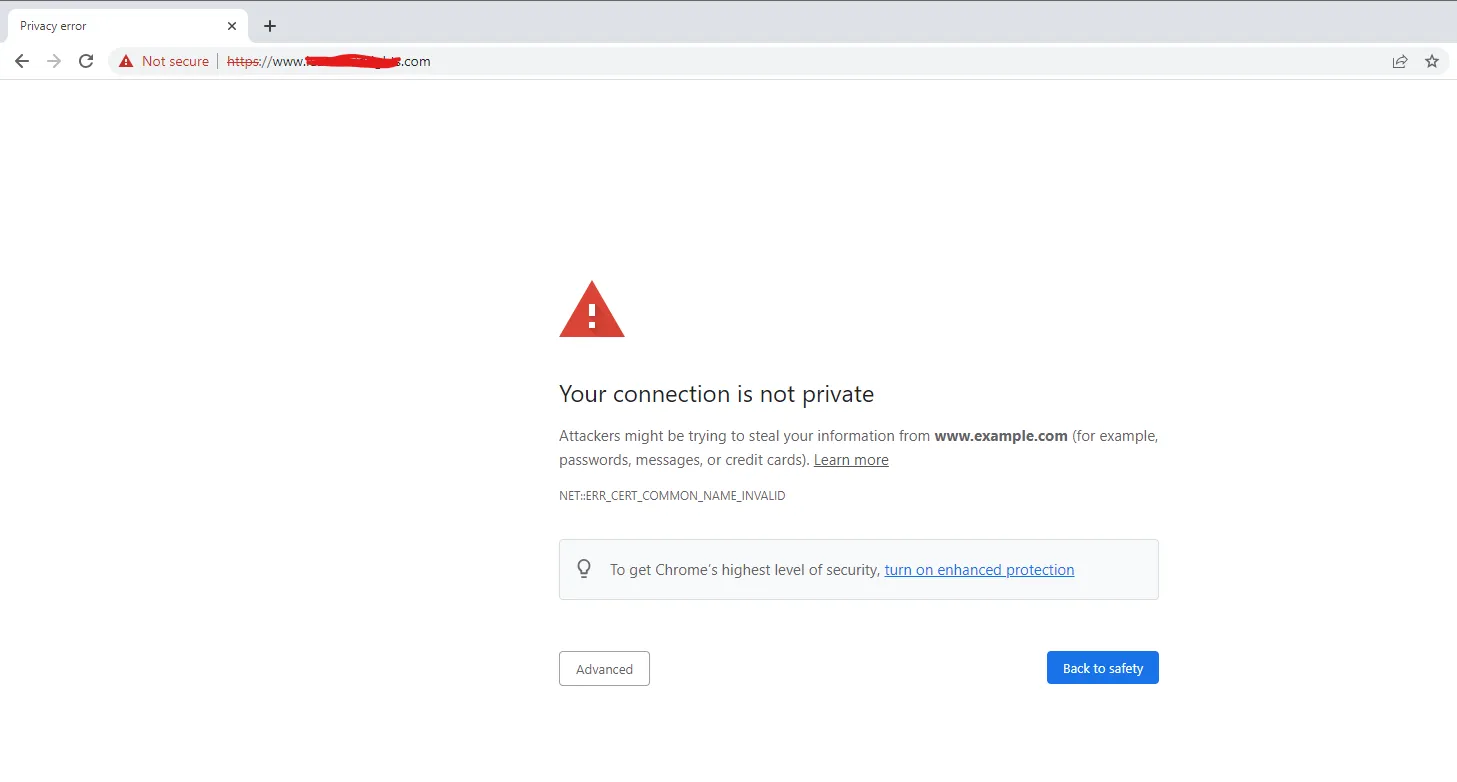The Anatomy of a Healthy Website
Discover the critical mistakes impacting your website health. Learn how these mistakes can render your business invisible, tarnish potential customer perception, and lead to costly long-term fixes.

Something I tell all my clients they need to prioritize is the health of their website. It matters more than any other marketing initiative. Before you spend money on advertising or marketing you must FIRST make sure that you have a healthy website to send visitors too. A healthy website is the foundation necessary for all additional marketing to build off of.
Keep reading this article to learn what it means to have a healthy website, why a healthy website is crucial for businesses looking to rise above their competitors, and how failing to invest in a healthy website risks expensive cleanup costs.
What Does it Mean to Have a Healthy Website?
Website health is a term used to categorize how well a website meets certain quality standards. There are three core categories that measure how healthy a website is: performance, security, and ease of use.
If you were to take a healthy website and an unhealthy website and compare them side-by-side, you might not be able to tell the difference. Visually they may look nearly identical, but beneath the surface is where the similarities end.
Websites with good health practices follow a set of standards that make it easier for customers to find your business, transition public perception of your business from commodity to authority, and reduce the risk of security failures that require expensive cleanup.
We will dive into each of these categories and how you can measure how healthy your website is, but first let’s address why a healthy website should be your number one marketing priority.
Healthy Websites are Good for Business!
As I mentioned before, a healthy website is THE FOUNDATION for all other marketing initiatives. Oftentimes a website is the first point of contact potential customers have with your business. If your website meets the necessary quality standards then these potential customers will walk away with a positive experience. Otherwise, these potential customers will leave for your competitors.
Let’s look at all the ways a healthy website can benefit your business:
Improved Online visibility
A healthy website with optimized performance will be favored by search engines like Google. This means more visibility to potential customers. A healthy website will be recommended more than an unhealthy one. If you want to stand out from competitors and attract more organic traffic to your business then website health is the place to start.
Enhanced User experience
A website that is fast, easy to navigate, and visually appealing provides a positive user experience. This encourages visitors to explore your site, engage with your content, and increases the chances of conversion.
Build Customer Trust
A secure website instills confidence in your customers. With robust security measures in place, such as SSL certificates and data encryption, you demonstrate that you value their privacy and protect their sensitive information. Websites that fail security best practices will show warning messages, oftentimes scaring away visitors.
Improved Brand Reputation
How we present ourselves says a lot about our values. A healthy website reflects positively on your business. It showcases professionalism, reliability, and a commitment to delivering a high-quality user experience. A positive brand image can lead to customer loyalty and word-of-mouth referrals.
Better Mobile Reach
A mobile-responsive website ensures your business is accessible to users on smartphones and tablets. With the increasing number of mobile internet users, having a mobile-friendly site expands your reach and allows you to tap into a larger audience.
Improved Search Engine Rankings
Search engines favor websites that are fast, secure, and user-friendly. By investing in website health, you increase your chances of ranking higher in search engine results pages (SERPs), driving more organic traffic to your website.
Better Marketing Opportunities
A healthy website serves as a strong foundation for effective digital marketing campaigns. Marketing efforts built on a strong foundation offer a better return on investment.
Competitive Advantage
Most small businesses don’t prioritize their website’s health. The reason being is that they don’t realize how important the website’s health is. A healthy website gives you a competitive edge. By staying up-to-date with the security best practices, creating an easy to use experience, and optimizing performance, you position your business as innovative and technologically advanced compared to competitors with outdated websites.
Long-Term Cost Savings
Imagine waking up one day only to discover that your website has been taken down or worse, hacked. Returning a website to its pre-emergency state is stressful, time consuming, and can be very costly. Maintaining a healthy website prevents potential issues and reduces the need for costly emergency fixes. Regular updates, security measures, and performance optimizations can help you avoid major setbacks and financial burdens in the long run.
The Three Core Website Health Standards
If you want your business to benefit from a healthy website then there are three core standards that you must follow.
Your Website Needs to be Performant!

We have all clicked a link only to find that the website we were hoping to see is stuck loading. Do we sit and wait? No! We click back and go to the next link on the list. This is a common reaction amongst most people. In fact, 1 in 4 visitors would abandon your website if it takes more than 4 seconds to load.
Not only do slow load times harm user experience, but it also affects how search engines, like Google, will recommend your website. Search engines are in the business of recommending content that the user is looking for. If a search engine sees someone click onto your website only to leave a few seconds later, then this signals that your website is not what searchers are looking for. Consequently, search engines will take note of this and consider recommending your website less.
The performance of your website raises two major implications:
- If your website is slow to load, potential customers will leave your website and head to your competitors.
- Search engines like Google will hide your website if it is slow so that they don’t recommend a website no one wants to visit.
How to Test Your Website’s performance
If you would like to see how quickly (or slowly) your website loads, then head over to GTmetrix. Pop your domain name (www.example.com) into their website speed analyzer and they will give your website a grade based on how quickly it would load. Anything under a letter grade of a B is cause for concern and indicates that you have some work to do with your website’s load speed.
Your Website Must be Secure!

In today’s digital landscape, data breaches and cyber attacks are all too common. As a business owner, it’s your responsibility to protect your customers’ sensitive information and ensure their privacy. Neglecting website security can have severe consequences, including financial loss, damage to your reputation, and loss of property. Let’s explore some essential security measures you should implement to ensure the health of your website.
Implement SSL (Secure Sockets Layer) Certificates
An SSL certificate encrypts the communication between your website and visitors’ browsers, ensuring that sensitive information, such as login credentials and payment details, remains secure. Not only does SSL protect your customers, but it also signals to search engines that your website is trustworthy, positively impacting your search engine rankings.
How to Check if Your Website Has An SSL Certificate
If you would like to make sure that you have an SSL certificate properly set up on your website then head enter your domain name in the browser bar. If you see a little lock next to the url then you are all set. If there is an error with your SSL then your browser will often show an error like the below image.

Keep Software Up to date
Out of date software is easy to hack. If hackers have a lot of time with the version of software that supports your website, then eventually they can find loopholes to cause mayhem. Regularly update your website’s software to ensure you have the latest security patches and bug fixes. Enable automatic updates whenever possible to streamline the process.
Platforms like Wix and GoDaddy will automatically roll out software updates on their systems. If your website uses a system like WordPress then you will need to manage these software updates yourself.
Use Strong Passwords and User Authentication
One of the simplest yet most effective security measures is to use strong passwords for all user accounts on your website. Encourage your team and customers to choose complex passwords and enable two-factor authentication (2FA) whenever possible. This adds an extra layer of security by requiring users to provide a second verification step, such as a unique code sent to their mobile device.
Always Keep a Website Backup!
Plan for the worst case and always keep a backed up version of your website. In the unfortunate event that your website is taken down, the only way you can recover your website is if you have a backed up version of your website. I have seen this happen to too many businesses that didn’t anticipate the worst case scenario. Don’t let this happen to you!
Your Website Should be Easy to Use!

No one likes visiting a website only to be greeted by a website that is scrolling off the screen and doesn’t make the information you are looking for easy to find. At the end of the day your website is for your potential customers! It must be built with them in mind!
Easy to use websites present important information in a concise, predictable, and intuitive way.
Here’s how to enhance user experience and navigation on your website:
Make Sure Your Website Looks Good on Your Phone
With a significant portion of internet traffic coming from smartphones and tablets, it is crucial for a website to adapt seamlessly to different screen sizes and resolutions. Failing to provide a mobile-friendly experience can result in frustrated visitors and missed conversion opportunities. Additionally, search engines prioritize mobile-friendly websites in their rankings, making mobile responsiveness a critical factor for improving visibility.
Simplify Navigation and Menu Structure
Design a clear and intuitive navigation menu that guides visitors effortlessly through your website. Make important information easy to find. Avoid overwhelming users with too many options. Group related pages under relevant categories and use descriptive labels to help visitors quickly find what they’re looking for.
Include Clear Call-to-Action Buttons
Unless prompted, users won’t take action. Guide visitors toward the next steps of becoming a customer by strategically placing clear and prominent call-to-action (CTA) buttons throughout your website. Whether it’s “Contact Us,” “Book Now,” or “Subscribe,” compelling CTAs prompt visitors to engage and convert.
Conclusion: Start with a Healthier Website Today!
Building a healthy website is a fundamental step toward business success in the digital world. By avoiding critical mistakes that can compromise your website’s health, such as neglecting performance optimization, overlooking security measures, and underestimating user experience, you can elevate your online presence and attract more customers.
If you would like a free website health audit then send an email to [email protected] with the subject line “Website Health Audit”. Be sure to inlcude the url to your website! I will personally review your website and provide insight into how you can create a healthier website.
As always feel free to reach out if you have any questions,
Clayton